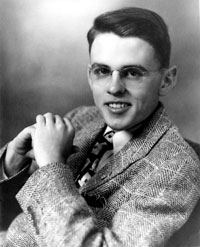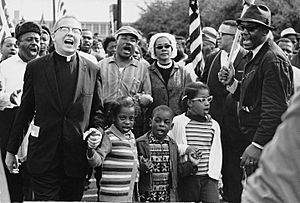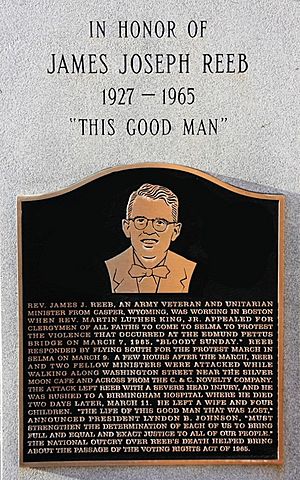James Reeb facts for kids
Quick facts for kids
James Reeb
|
|
|---|---|
 |
|
| Born |
James Joseph Reeb
January 1, 1927 |
| Died | March 11, 1965 (aged 38) |
| Cause of death | Murder |
| Nationality | American |
| Alma mater | St. Olaf College Princeton Theological Seminary |
| Occupation | Unitarian Universalist minister |
| Known for | Civil Rights Movement |
| Spouse(s) | Marie Deason |
| Children | 4 |
James Joseph Reeb (born January 1, 1927 – died March 11, 1965) was an American minister and activist. He was a Unitarian Universalist minister who worked for fairness and equal rights. James Reeb was an important part of the Civil Rights Movement in the 1960s. He helped fight for African-American voting rights. While taking part in peaceful protests in Selma, Alabama, in 1965, he was attacked. He died two days later from his injuries. His death shocked the nation and helped push for new laws.
Contents
Early Life and Education
James Reeb was born on January 1, 1927, in Wichita, Kansas. His parents were Mae and Harry Reeb. He grew up in Kansas and Casper, Wyoming. After finishing high school in 1945, he joined the Army. He served for about a year and a half.
After the Army, James Reeb continued his studies. He went to Casper Junior College. Then he attended St. Olaf College and graduated in 1950. He later studied at Princeton Theological Seminary in Princeton, New Jersey. He became a Presbyterian minister in 1953.
A New Path in Ministry
As James Reeb learned more about religion, his beliefs changed. He moved away from traditional Presbyterian teachings. He became interested in the Unitarian Universalist church. This church focused on helping people and making society better. In 1957, he became a Unitarian minister.
Reeb believed in taking action to help others. He and his wife, Marie Deason, had four children. They chose to live in poor neighborhoods. He wanted to work directly with people who needed help. He worked as a youth director at the Y.M.C.A. in Philadelphia. There, he stopped unfair rules about race. He also started a program to help kids get to the Y.M.C.A.
Later, Reeb became an assistant minister at All Souls Church in Washington, D.C.. He worked there for three years. In 1964, he moved to Boston. He worked for the American Friends Service Committee. His job was to help people find fair housing. He fought for the rights of all renters, especially African-American and Hispanic families. The Reeb family was one of the few white families living in their diverse neighborhood. James Reeb felt it was important to live among the people he was trying to help.
Activism and Tragic Death
James Reeb was a member of the Southern Christian Leadership Conference (SCLC). This group worked for civil rights. In March 1965, he traveled to Selma, Alabama. He joined the Selma to Montgomery marches. These marches were peaceful protests. Their goal was to get voting rights for African Americans. The protests followed a violent attack on marchers known as "Bloody Sunday."
On March 9, 1965, after eating dinner, James Reeb and two other ministers were attacked. White men beat them with clubs. The attack happened because they supported African-American rights. Reeb was badly hurt. The local hospital in Selma could not treat him. It took two hours to get him to a hospital in Birmingham, Alabama. Doctors tried to save him with brain surgery.
While Reeb was on his way to the hospital, Martin Luther King Jr. spoke about the attack. He asked everyone to pray for Reeb. James Reeb went into a coma. He died two days later from his injuries.
Impact and Aftermath
James Reeb's death caused a huge reaction across the country. Many people were upset by the violence. Tens of thousands of people held vigils to honor him. President Lyndon B. Johnson called Reeb's family to offer his sympathy. On March 15, President Johnson spoke to Congress. He mentioned Reeb's death when he introduced the Voting Rights Act of 1965. This act aimed to protect the right to vote for all Americans.
Martin Luther King Jr. spoke at Reeb's memorial service in Selma. He said that James Reeb showed the good spirit of the nation. King said Reeb was a witness to the idea that people of different races could live together. He urged people to be brave and fight against unfair systems.
Some people in Alabama tried to spread false stories about Reeb's death. They tried to make it seem like he was not attacked by white supremacists. However, the truth was that he was a victim of violence.
The Voting Rights Act of 1965 was passed on August 6, 1965. This was a major victory for the Civil Rights Movement.
In April 1965, four men were accused of Reeb's murder. Three of them were tried in December. An all-white jury found them not guilty. The fourth man was never brought to trial. James Reeb's murder remains officially unsolved.
In 2007, the FBI reopened the case. This was part of their Cold Case Initiative. However, in 2011, the case was closed again. The FBI found that three of the four men believed to be involved had died. The only surviving person had already been found not guilty in court.
Investigations and New Information
In 2019, NPR journalists shared new findings. They had investigated the case for several years. They found a new eyewitness, Frances Bowden. They also identified a fourth man, William Portwood, who was involved. He had not been named before.
The journalists interviewed William Portwood in 2017. He remembered being there and said he had kicked one of the ministers. Frances Bowden, who owned a nearby business, also shared what she saw. She said that four men attacked the ministers. She stated that Elmer Cook was the one who hit Reverend Reeb with a club. William Portwood died in 2017.
Media Portrayals
James Reeb was played by actor Jeremy Strong in the 2014 movie Selma.
See also
- Viola Liuzzo
- List of unsolved murders
 | Delilah Pierce |
 | Gordon Parks |
 | Augusta Savage |
 | Charles Ethan Porter |



